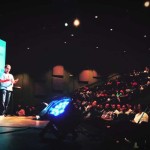We run our website the way we wished the whole internet worked: we provide high quality original content with no ads. We are funded solely by your direct support. Please consider supporting this project.
The Lego Movie & Free Will

Last week Greg tweeted about two movies that have themes related to human free-will and God’s control of the world. They were:
@greg_boyd: Does God want a permanently frozen “perfect” world or an open-ended world filled with wildly imaginative people? Watch “The Lego Movie”!
@greg_boyd: Meantime, me & some peeps are going to watch (again!) THE greatest movie about the nature of time/free will & love-“The Adjustment Bureau.”
In the book God of the Possible, Greg responds to a question that gives some theological background to what he finds insightful about these two movies.
_________________________
Question:
Why would God create a world with free wills he can’t meticulously control or foreknow, a world that allows people to oppose his will, hurt other people, and damn themselves?
Answer:
This question assumes that it would have been better to create a world in which there were no free wills, in which people could never oppose God’s will, hurt other people, or damn themselves. Such a world would on one level be “perfect,” but it would also be perfectly robotic. God would get everything he wants, except the one thing he really wants — namely, agents who freely choose to participate in his triune love. Love has to be chosen, and this means that love is inherently risky. Reason, intuition, and certainly experience tell us this is true.
Consider this example: suppose you possess the technological knowledge to program a computer chip and secretly implanted it in your spous’s brain while he or she was sleeping. This chip would cause your spouse to talk and act exactly as you would want, though your spouse would still think here she was choosing to talk and act this way. That person would, on one level, be “the perfect spouse.” The loving behavior and words would be exactly what you desire. You would, in fact, know exactly what your spouse was going to say and do before he or she did. After all, you programmed the responses.
We might enjoy such an arrangement for a while, but wouldn’t you eventually grow tired of it? Wouldn’t it be unfulfilling? For you would know that everything your spouse was saying and doing to you, as wonderful as it might be, was really you saying and doing to yourself. Your spouse may speak and act loving toward you, but he or she would not truly be loving you. It would all be a charade. There would, in fact, be no real person, no thinking, feeling, and willing agent, who would be intentionally choosing to love you on his or her own. The fact that your spouse would experience himself or herself as choosing to love doesn’t change this, for this experience also is simply due to the sophistication of your programming. Your spouse’s sense of free will is an allusion. For love to be real, it must really be possible to choose against it.
This illustration demonstrates that love must be chosen. It could not be otherwise. It’s part of its very definition. As a triangle must have three sides and all bachelors must be unmarried, so love must be chosen. This means that love is, by its very nature, risky. To create a cosmos populated with free agents (angels and humans) who are capable of choosing love requires that God created a cosmos in which beings can choose to oppose his will, hurt other people, and damn themselves. If love is the goal, this is the price. (133-135)
Category: General
Tags: Determinism, Free Will, Love, Predestination
Related Reading

What Jesus Revealed About Being Human
According to the creation story, when Adam and Eve ate the fruit, they essentially ceased being the wonderful, God-centered, God-dependent human beings the Creator intended them to be. They became less than fully human. Instead, they began using everything and everyone in the world as surrogate gods, trying to get from people, deeds, and things…

Tragedy Strikes and Coherence Goes Out the Window
I encourage you to read Aurora shooting inspires various perspectives on God and belief, written by Electa Draper and published on the front page of the Denver Post Monday. The article shows how differently believers process tragedies, and illustrates the centrally important role one’s picture of God plays in these responses. For today, I’d like…

Guest Post: Culture War Neighbors by Bonnie Kristian
Matteo Parrini via Compfight The first time I was aware of meeting a gay person, I was 18. I took a summer job waiting tables, and it turned out two of my coworkers were attracted to people of the same sex. One, a waiter in his 40s, fit every stereotype on Will and Grace. The…

Sermon Clip: Extravagant Forgiveness, Extravagant Love
Greg Boyd had the wonderful opportunity to guest speak at a great church in Carlisle, PA called Carlisle BIC. He spoke on the topic of forgiveness and love. In this short clip, Greg describes how a prostitute was being judged by the Pharisees, but Jesus came to her rescue. You can listen to the full…

What the hell are we doing here?
Meet Collin Simula. He lives in Columbus, Ohio, and is a part of Central Vineyard church. He is a 30-year-old graphic designer, and a happily married father of three. Collin has spent his whole life in the Church, in every denomination imaginable, from Calvinist/Christian Reformed churches, to a Baptist high school, being a part of…

URI Inauguration of David M. Dooley -Greg’s Speech: 4/8/10
Watch Greg’s Speech at the Inauguration of David M. Dooley at the University of Rhode Island.
